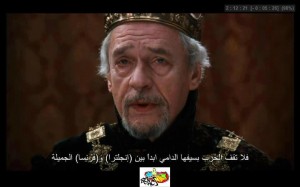
(Photo from React Facebook)
In an attempt to modernise the traditional Egyptian education system, develop new learning techniques and give students the opportunity to acquire more skills, a new initiative was launched by students of the Faculty of Alsun at Ain Shams University.
“Students get lost after graduation, they do not know how to channel their qualifications and how to exploit their unique advantages in the beginning of their career,” Eslam Ashraf, cofounder of the React initiative, said
Ashraf and a number of his colleagues found during their studies that the education system at their faculty does not prepare them well for the labour market. The faculty does not offer any training in movie and script translation and even literary translation courses are not offered before the last year prior to graduation.
Unsatisfied with this situation the students founded React. It was the first student initiative in their faculty, and React aims to increase the student’s skills through a number of projects, in addition to promoting self discovery and help them discover their own abilities.
The first project React initiated was Re-trans, which focuses on teaching language students to translate foreign movies to Arabic. The founders of React worked with a number of foreign cultural centres, including the Czech, German and Italian centres, to pick famous movies to translate into Arabic. Once the translations were done, “the cultural centres organised screenings of their movies featuring our translations in their venues and the work we had done proved to be very professional,” Ashraf said.
As well as improving students’ capabilities, Re-trans aims to introduce Egyptian audiences to films from different cultures other than just English and American ones. “We are thought to be the first ones to translate a Czech movie into Arabic in Egypt and the Middle East,” Ashraf said.
React has been working on the Re-trans project for the past three years. In the first year only three films were translated, in their second year they managed to translate eight, and finally this year 24 films were translated, including films from Spain, the Czech Republic, Italy and many more.
Over the past month React showed the majority of their translated movies in a number of foreign culture centres. “One of the films that was screened was the Italian film Il Padre E Lo Straniero (The Father and the Foreigner), which stars Egyptian actor Amr Waked, who attended the screening,” Ashraf said.
When the project started it was initially renounced by board and professors of the faculty board, but today they share their academic and professional expertise with the members of React and all films that are translated are supervised by professors of the faculty.
React’s other projects include Areeka, which aims to develop students’ skills and bolster their critical thinking and the Da’bes project.
Da’bes is an Egyptian vernacular term which means “search”, and the project aims to introduce the faculty students to unknown cultural national treasures and prepare them to be successful and unique tour guides.
“Egypt is not only the sphinx and the pyramids, which is what we keep saying to the members of React and the faculty students in general,” Ashraf said. React has staged many conferences for students, which were conducted by Egyptian researchers and professors and highlighted several cultural heritage subjects, like the origins of Tanoura art and Egyptian pottery.
React tries to reduce the gap between the Egyptian education system and the needs of the modern-day sophisticated labour market. It also focuses on the schism of thought between the traditional methods used by most teachers and the younger generation who want to break the established rules to be able to react positively to the requirements of today.




